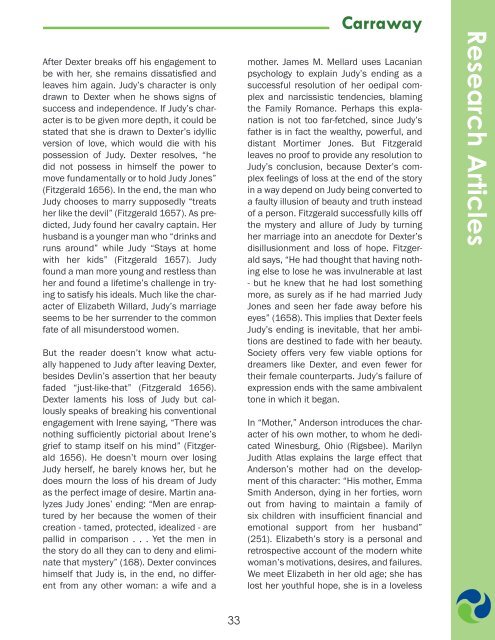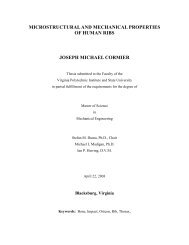Research Articles - VTechWorks - Virginia Tech
Research Articles - VTechWorks - Virginia Tech
Research Articles - VTechWorks - Virginia Tech
Create successful ePaper yourself
Turn your PDF publications into a flip-book with our unique Google optimized e-Paper software.
After Dexter breaks off his engagement to<br />
be with her, she remains dissatisfied and<br />
leaves him again. Judy’s character is only<br />
drawn to Dexter when he shows signs of<br />
success and independence. If Judy’s character<br />
is to be given more depth, it could be<br />
stated that she is drawn to Dexter’s idyllic<br />
version of love, which would die with his<br />
possession of Judy. Dexter resolves, “he<br />
did not possess in himself the power to<br />
move fundamentally or to hold Judy Jones”<br />
(Fitzgerald 1656). In the end, the man who<br />
Judy chooses to marry supposedly “treats<br />
her like the devil” (Fitzgerald 1657). As predicted,<br />
Judy found her cavalry captain. Her<br />
husband is a younger man who “drinks and<br />
runs around” while Judy “Stays at home<br />
with her kids” (Fitzgerald 1657). Judy<br />
found a man more young and restless than<br />
her and found a lifetime’s challenge in trying<br />
to satisfy his ideals. Much like the character<br />
of Elizabeth Willard, Judy’s marriage<br />
seems to be her surrender to the common<br />
fate of all misunderstood women.<br />
But the reader doesn’t know what actually<br />
happened to Judy after leaving Dexter,<br />
besides Devlin’s assertion that her beauty<br />
faded “just-like-that” (Fitzgerald 1656).<br />
Dexter laments his loss of Judy but callously<br />
speaks of breaking his conventional<br />
engagement with Irene saying, “There was<br />
nothing sufficiently pictorial about Irene’s<br />
grief to stamp itself on his mind” (Fitzgerald<br />
1656). He doesn’t mourn over losing<br />
Judy herself, he barely knows her, but he<br />
does mourn the loss of his dream of Judy<br />
as the perfect image of desire. Martin analyzes<br />
Judy Jones’ ending: “Men are enraptured<br />
by her because the women of their<br />
creation - tamed, protected, idealized - are<br />
pallid in comparison . . . Yet the men in<br />
the story do all they can to deny and eliminate<br />
that mystery” (168). Dexter convinces<br />
himself that Judy is, in the end, no different<br />
from any other woman: a wife and a<br />
33<br />
Carraway<br />
mother. James M. Mellard uses Lacanian<br />
psychology to explain Judy’s ending as a<br />
successful resolution of her oedipal complex<br />
and narcissistic tendencies, blaming<br />
the Family Romance. Perhaps this explanation<br />
is not too far-fetched, since Judy’s<br />
father is in fact the wealthy, powerful, and<br />
distant Mortimer Jones. But Fitzgerald<br />
leaves no proof to provide any resolution to<br />
Judy’s conclusion, because Dexter’s complex<br />
feelings of loss at the end of the story<br />
in a way depend on Judy being converted to<br />
a faulty illusion of beauty and truth instead<br />
of a person. Fitzgerald successfully kills off<br />
the mystery and allure of Judy by turning<br />
her marriage into an anecdote for Dexter’s<br />
disillusionment and loss of hope. Fitzgerald<br />
says, “He had thought that having nothing<br />
else to lose he was invulnerable at last<br />
- but he knew that he had lost something<br />
more, as surely as if he had married Judy<br />
Jones and seen her fade away before his<br />
eyes” (1658). This implies that Dexter feels<br />
Judy’s ending is inevitable, that her ambitions<br />
are destined to fade with her beauty.<br />
Society offers very few viable options for<br />
dreamers like Dexter, and even fewer for<br />
their female counterparts. Judy’s failure of<br />
expression ends with the same ambivalent<br />
tone in which it began.<br />
In “Mother,” Anderson introduces the character<br />
of his own mother, to whom he dedicated<br />
Winesburg, Ohio (Rigsbee). Marilyn<br />
Judith Atlas explains the large effect that<br />
Anderson’s mother had on the development<br />
of this character: “His mother, Emma<br />
Smith Anderson, dying in her forties, worn<br />
out from having to maintain a family of<br />
six children with insufficient financial and<br />
emotional support from her husband”<br />
(251). Elizabeth’s story is a personal and<br />
retrospective account of the modern white<br />
woman’s motivations, desires, and failures.<br />
We meet Elizabeth in her old age; she has<br />
lost her youthful hope, she is in a loveless<br />
<strong>Research</strong> <strong>Articles</strong>



